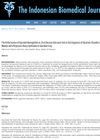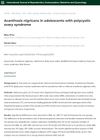 22 citations,
September 2015 in “Fertility and Sterility”
22 citations,
September 2015 in “Fertility and Sterility” The oral glucose tolerance test is effective in detecting abnormal glucose tolerance in Indian women with PCOS.
 189 citations,
March 2018 in “Human Reproduction Update”
189 citations,
March 2018 in “Human Reproduction Update” Women with PCOS are more likely to have impaired glucose tolerance and type 2 diabetes, especially if they are Asian or obese.
 1 citations,
October 2021 in “Prilozi - Makedonska akademija na naukite i umetnostite. Oddelenie za medicinski nauki”
1 citations,
October 2021 in “Prilozi - Makedonska akademija na naukite i umetnostite. Oddelenie za medicinski nauki” Many women with polycystic ovary syndrome have normal blood sugar, but some may have higher blood sugar levels or diabetes, especially if they are older, overweight, and have certain hormone levels.
 6 citations,
January 2020 in “The Aging Male”
6 citations,
January 2020 in “The Aging Male” Testosterone replacement therapy improved blood sugar and fat levels without raising prostate cancer risk in Japanese men with low testosterone.
 1 citations,
June 2021 in “The Indonesian Biomedical Journal”
1 citations,
June 2021 in “The Indonesian Biomedical Journal” Glycated hemoglobin is not as effective as the oral glucose tolerance test for diagnosing blood sugar problems in women with PCOS in Southern Iraq.
13 citations,
February 2016 in “Journal of steroid biochemistry and molecular biology/The Journal of steroid biochemistry and molecular biology” Mice without active or present vitamin D receptors maintain normal blood sugar control and islet gene expression when calcium levels are normal.
 December 2023 in “Journal of the Endocrine Society”
December 2023 in “Journal of the Endocrine Society” Blocking glucocorticoid receptors improves glucose metabolism in a PCOS mouse model.

High insulin levels are more common and a better predictor of carbohydrate issues in women with PCOS than glucose tolerance tests.
 7 citations,
January 2007 in “PubMed”
7 citations,
January 2007 in “PubMed” Women with androgenetic alopecia (AGA) are more insulin resistant than healthy women, with various insulin sensitivity indices being higher in the AGA group. An oral glucose tolerance test is suggested for women with AGA.
 3 citations,
March 2007 in “Canadian Medical Association Journal”
3 citations,
March 2007 in “Canadian Medical Association Journal” Women with PCOS should have an oral glucose tolerance test for effective diabetes screening.
 60 citations,
April 2003 in “Human Reproduction”
60 citations,
April 2003 in “Human Reproduction” Young Czech women with PCOS have a higher risk of heart problems and should be regularly checked for cholesterol and glucose issues.
 7 citations,
March 2011 in “Hormone and Metabolic Research”
7 citations,
March 2011 in “Hormone and Metabolic Research” Certain gene variations might help protect against insulin resistance and glucose intolerance in people with Polycystic Ovary Syndrome.
 35 citations,
January 2011 in “Clinical Endocrinology”
35 citations,
January 2011 in “Clinical Endocrinology” Metformin should be used for PCOS mainly in those with glucose intolerance, and has limited benefits for infertility or hirsutism.
 February 2022 in “International journal of reproduction, contraception, obstetrics and gynecology”
February 2022 in “International journal of reproduction, contraception, obstetrics and gynecology” Acanthosis nigricans in teenage girls with PCOS is a sign of obesity, not insulin resistance or glucose intolerance.
 11 citations,
April 2013 in “Hormones”
11 citations,
April 2013 in “Hormones” New information suggests that metformin might help more women with PCOS and infertility, not just those with glucose issues.
 815 citations,
April 2010 in “The Journal of Clinical Endocrinology & Metabolism”
815 citations,
April 2010 in “The Journal of Clinical Endocrinology & Metabolism” Women with PCOS should be screened for heart disease risk and manage their health to prevent it.
 70 citations,
March 2010 in “The Journal of Steroid Biochemistry and Molecular Biology”
70 citations,
March 2010 in “The Journal of Steroid Biochemistry and Molecular Biology” Blocking a specific enzyme might help treat obesity and diabetes, but more research is needed to ensure it's safe.
 41 citations,
September 2014 in “Journal of Pharmacy and Pharmacology”
41 citations,
September 2014 in “Journal of Pharmacy and Pharmacology” Melatonin may help treat PCOS symptoms in rats.
 35 citations,
May 2015 in “Arquivos De Gastroenterologia”
35 citations,
May 2015 in “Arquivos De Gastroenterologia” Women with PCOS are more likely to have fatty liver disease and worse metabolic health.
 21 citations,
February 2016 in “Reproductive Biomedicine Online”
21 citations,
February 2016 in “Reproductive Biomedicine Online” The conclusion suggests that PCOS may persist due to genetic traits that, while harmful for female fertility, could have provided survival and reproductive benefits to males.
16 citations,
November 1998 in “Fertility and sterility” Doctors used to view PCOS too narrowly, but now understand that insulin resistance is a key factor in the condition.
 14 citations,
May 2013 in “American Journal of Physiology-endocrinology and Metabolism”
14 citations,
May 2013 in “American Journal of Physiology-endocrinology and Metabolism” Removing myelin protein zero-like 3 in mice leads to better metabolism and resistance to obesity.
 3 citations,
June 2004 in “Reviews in gynaecological practice”
3 citations,
June 2004 in “Reviews in gynaecological practice” Early treatment and weight management are important for teenagers with PCOS to reduce symptoms and long-term health risks.
2 citations,
August 2022 in “Middle East Fertility Society Journal” The new rodent model successfully mimics non-lean human PCOS symptoms.
April 2017 in “The FASEB journal” Low selenium levels worsen health but increase lifespan in mice.
June 2021 in “Current developments in nutrition” High doses of finasteride lower cholesterol and body weight in certain mice.
 May 2020 in “Current developments in nutrition”
May 2020 in “Current developments in nutrition” Low dose finasteride doesn't change lipid profile or metabolic parameters in mice.
 10 citations,
March 2016 in “The Journal of Obstetrics and Gynecology of India”
10 citations,
March 2016 in “The Journal of Obstetrics and Gynecology of India” The article suggests renaming Polycystic Ovarian Syndrome (PCOS) to "Hyperandrogenic Persistent Ovulatory Dysfunction Syndrome" (HA-PODS) for accuracy and consistency, but no final decision was made.
 8 citations,
November 2012 in “Journal of Endocrinological Investigation”
8 citations,
November 2012 in “Journal of Endocrinological Investigation” Greek women with classic PCOS are more likely to have metabolic syndrome and insulin resistance than those with newer PCOS types.
4 citations,
December 2021 in “Pharmacological Reports” Metformin is less effective in men with early-onset hair loss.























